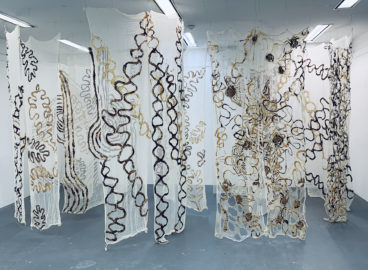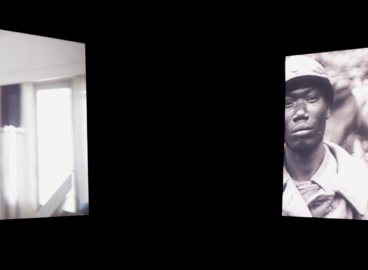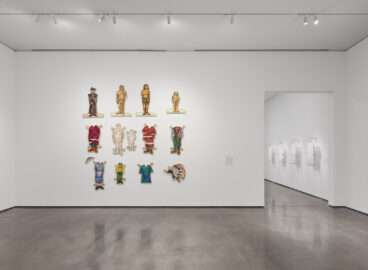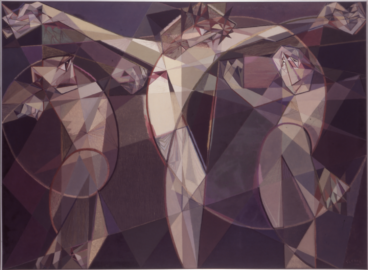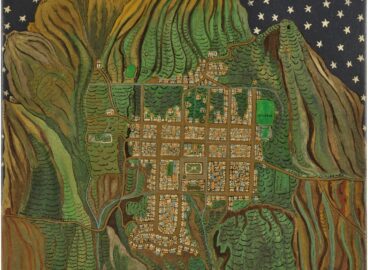The 2022 C-MAP seminar series, Transversal Orientations Part II, was held on Zoom across four panels on May 25 and 26, 2022. This text by Irmgard Emmelhainz, independent translator, writer and researcher, is the second written response to the seminar. The seminar series was organized by Nancy Dantas, C-MAP Africa Fellow, Inga Lāce, C-MAP Central and Eastern Europe Fellow, Madeline Murphy Turner, Former Cisneros Institute Research Fellow for Latin America, and Wong Binghao, C-MAP Asia Fellow.
According to Rosi Braidotti, transversality (a term originally coined by Félix Guattari, then put at work in his collaborative work with Gilles Deleuze, in A Thousand Plateaux) is an operational concept that helps to understand the subject across multiple axes, recognizing that subjectivity is embedded within other transversal selves bonded by ontological relationality.1See Félix Guattari, “Transversality” in Molecular Revolution: Psychiatry and Politics, trans. Rosemary Sheed (Harmondsworth: Penguing Books, 1984) and Gilles Deleuze and Felix Guattari, A Thousand Plateaus, trans. Brian Massumi (London: Athlone Press, 1988). Indeed, we require a subject position worthy of our times, which means, after Braidotti, that we need to prioritize issues linked to social justice, ethical accountability, and transgenerational solidarity but that we also need to deal with colonialism, racialization, and other forms of injury derived from colonial and human-centered modern life-forms.2Rosi Braidotti, The Posthuman (London: Polity Press, 2013), 21–24.
Isabel Sandoval and Sophio Medoidze, presenters at the Rituals and Rapture Panel at the 2022 edition of C-MAP’s annual seminar series in May, outlined a variety of global contemporary forms of transversal subjectivity: Medoidze’s film Let us flow! (ვიდინოთ!) (2022) documents a community in the remote Caucasian Tusheti mountains in Georgia. Inaccessible to most, the region remains a natural sanctuary and one of the most ecologically “virginal” communities in the world. Medoidze’s gaze unravels the complexities inherent to maintaining law, order, and tradition in a premodern community in charge of guarding an ancestral shrine while dealing with the effects of the inevitable need to embrace aspects of modern life, such as mechanization, technology, and commodities. The film is about a community in flux, inhabiting a territory through what binds them, and about the tensions between past and present, between the very ancient ways they conduct their rituals and development. The subjectivities addressed by Medoidze are transhistorical. Then, Isabel Sandoval’s Lingua Franca (2019) tells the story of a Philippine trans immigrant in New York who makes a living looking after an older Russian Jewish woman withering with dementia. Arresting images inspired by Belgian filmmaker Chantal Akerman depict contemporary New York through the vagaries of the lived precarity of a migrant doing reproductive labor for a living. Sandoval also depicts the strain put on families by an elderly or ill person, how caretaking enters into conflict with individual desires, as well as the split between the migrant’s life here and there—a gap filled by regular phone calls with her mother. The subjectivities laid out in the film are transgender and transgeographical. There was also Diana Tamane, who presented work relating to her grandmother and mother in a transgenerational approach to microhistories. She presented the series of photographs titled Flower Smuggler (2016–19), which shows beautifully arranged flowers in vases, as well as the documents from the Federal Customs Service of Russia relating to when her grandmother was accused of smuggling two pots of flowers across the border between Latvia and Russia to place on her dead grandfather’s grave. She also presented photographs and a video gathered under the title Mom (2016), which offer a portrait of her mother who, due to economic transformations in post-Soviet Latvia, worked as truck driver, distributing food between Latvia, Spain, and Italy. There are also the Family Portrait (2013– ), which depicts four generations of women, including Tamane, who every year make a picture together, and work generated by findings in her family album. Men are absent from the pictures, and the subjectivities laid out are transgenerational and transterritorial. Finally, Pamila Gupta presented a form of a transimperial, transcultural, and transethnographic subjectivities as laid out in her book Portuguese Decolonization in the Indian Ocean World (2018), which connects India and Southern Africa historically and ethnographically, observing communities that, at the end of Portuguese colonization in Mozambique, did not fit so easily within the labels of colonizer or colonized.3Pamila Gupta, Portuguese Decolonization in the Indian Ocean World: History and Ethnography (London: Bloomsbury Academic, 2018). All of the subjectivities exposed in the seminar are in search of agency, and come from disenfranchised and disempowered contexts: the pre-political Tushetian community in Georgia, a Philippine trans immigrant, working-class women fending on their own in Eastern Europe, and Hindus in postcolonial Mozambique. These microhistories enable a plural and complex vision of history, and of the global present, traversed by class, race, and gender specificities.
The subjects laid out in the seminar are thus situated across a variety of fractures addressing power differences and differential degrees of access to the benefits of citizenry, security, and technological advances, addressing key issues of our times, including global flows of migration, displacement, economic disparity, rising racism and homophobia, xenophobia, warfare, and developmentalism. These subjectivities are anthropocentric and beyond ecosophical assemblages that include nonhuman actors. They are deeply steeped in the cultural world, and traditional in the sense that they are constructed through a humanist paradigm. This humanist subjectivity stems from the principle of the agency of man over a world premised on rationalism. Humanist subjectivation means to throw away the shackles of tradition, religion, and history to enable “man” to take over “his” destiny. This human quest to take charge of history has informed Western political movements, from the French Revolution, to class struggle, to the Zapatista uprising, to discourse around the recognition of rights, giving way to the figures of the “proletariat,” the “subaltern,” or the “non-cis” and the “underdeveloped.”
Humanist subjectivity is furthermore figured as a locus of potential consciousness, and traversed and vexed by colonial and postcolonial identity ambivalence. This form of subjectivation implies a search for a modern authentic being in the face of postcoloniality, positing identity as more than a rational individuating project within the utopian plenitude of romantic community. It involves reclaiming the ground lost in history to colonization, where the self may recognize itself in the form of a collectively emancipated subject recovered from the plundering of its culture and historical memory. In this context, a debate emerges on how to politicize one’s otherness: as subaltern demanding recognition or, for example, through the postmodernist understanding of the operations of power in relation to how the cultural production of minorities, such as feminists and Black people, has been inevitably positioned within modern institutions. This form of humanist postcolonial subjectivity posits a unique individual being, one with a distinctive inner voice and a string of experiences that cannot be repeated. It also implies human agency over our environment and a human drive for emancipation as the ultimate good. In this sense, desire as a revolutionary force, as the desire to self-determine, to become an individual, to shape oneself according to one’s needs and the wish to exist as separate from the community, and to be recognized, are the premises for the individual salvation of everyone. Affect, sensations, desires, memories are indeed at stake in producing transversal subjectivities across temporalities of decolonization and displacement. How do these forms of attachment and sensations of connection create communities? How do they establish interrelational webs or enable us to take root?
We should bear in mind that these transversal subjectivities operate in the field of representation—that is to say, they emerge in a field in which identities come to the fore seeking subjectivation and political self-determination. This is the same field in which violence is originated and managed, and for most of the twentieth century, this field was constructed by development discourse, which had been central to and the most ubiquitous operator within the politics of representation and identity in much of Asia, Africa, and Latin America in the post–World War II period. In this context, the European modernity project was appropriated as a national project in postindependence countries, giving way to the suppression of local cultures in the name of development. As a regimen of representation, development was linked to an economy of production and desire, but also of closure, differentiation, and violence, which came to be the sources of identity. What Jean-François Lyotard argued about the becoming working class of peasants and unemployed, without a doubt, applies to colonized subjectivities, for whom, Lyotard argued, the process of modernization was joyful. He wrote, “[Workers] enjoyed the mad destruction of their organic body which was indeed imposed on them, they enjoyed the decomposition of their personal identity, the identity of the peasant tradition had constructed for them, enjoyed the dissolution of their families and villages. . . .”4Jean-François Lyotard, Libidinal Economy, trans. Iain Hamilton Grant (Bloomington: Indiana University Press, 1993), 111. This paragraph turns out to be very controversial because it describes the kern of the contradictions of modernity seen from the point of view of the Anthropocene: Would former peasants want to give up their anonymous suburbs and pubs and return to peasantry, to precapitalist territorialities, families, and villages? Would being unable to give up our late capitalist desires mean that we have always been techno-addicts and hooked to commodities? Or are we, in truth, primitives, organically linked to mother earth and indoctrinated and victimized by the modern colonial heteropatriarchal military-industrial complex? The very existence of the Third World has been, in fact, wagered, managed, and negotiated around the politics of representation surrounding modernization and development.
Humanist subjectivity in the postcolonial world, moreover, came with the belief, promise, and desire for development, which became a certainty in the social imaginary. Development posits social life as a technical problem, as a matter of rational decision that requires the management of experts. Development has implied making postcolonial societies fit a preexisting model that embodies the structures and functions of modernity, subjecting populations to an infinite variety of interventions encompassing post (neo)colonial forms of power and systems of control, and selling Third World resources to the most convenient bidder, degrading physical and human ecologies, orienting economies around primitive accumulation or extractivism. Institutional practices and technology and infrastructure are crucial for development, and they have contributed to producing and formalizing social relations, divisions of labor, cultural forms, the production of discourses, and subjectivities.
One of the tenets of postcolonial theory is (to put it briefly) that everything must be locally situated and historically contextualized, and at the core of developmentalist subjectivity is the desire to be recognized. The private certitudes embedded in the desire for recognition and the politicization of a “subaltern,” “decolonial,” “underdeveloped,” and even a “non-cis” subjectivity, stem from the humanist values and morals that found liberal modernity. The problem is that these narratives are now out of sync with the world in which we live. In as far as individual narratives are the lens through which we understand the present, we are failing to see the shape of the societies we inhabit in the face of the ever speeding up of cultural change. These forms of subjectivation also fail to shed light on the contemporary manifestation of the modern relationship between humankind and machines, which is the content and form of subjective arrangements. Machines, which are the reality constructed by capitalism, are not specters of modernity but rather the concrete forms in which life organizes itself, and the world transforms itself and enables the material connections within which subjectivities are produced.
What is more, in our contemporary world, as collective efforts are monopolized by humanism’s drive for emancipatory freedom, our imaginations are limited, while rational models, stable empirical facts, and data or system prediction no longer offer us reassuring truths. To what extent are our current crises exacerbated by our ideological commitment to the tenets of liberal humanism? Following Franco Berardi, “progress” has given us a world in strife and chaos; the desire to be seen, constitutive of modern subjectivities, has led to extreme polarization and ethnic hatred, giving way to the disintegration of the hegemonic geopolitical order that resulted from five centuries of white colonization and extraction.5Franco “Bifo” Berardi, “Resign.” e-flux journal, no. 124 (February 2022), https://www.e-flux.com/journal/124/443422/resign/. We are also realizing that human agency over the planet is a fantasy that no longer holds. A parallel modernity is thus emerging, one that is decentering human perspective, questioning the founding myths of modernity. A notion of the “post-human” in Rosi Braidotti’s sense (not in the Silicon Valley sense) is necessary, to bring back issues of survival, interdependency, relationality—and to conceptualize transversal assemblages encompassing material reality entangled with that which is outside the human, to free language from voice and representation, to approach the radically inhuman.
- 1See Félix Guattari, “Transversality” in Molecular Revolution: Psychiatry and Politics, trans. Rosemary Sheed (Harmondsworth: Penguing Books, 1984) and Gilles Deleuze and Felix Guattari, A Thousand Plateaus, trans. Brian Massumi (London: Athlone Press, 1988).
- 2Rosi Braidotti, The Posthuman (London: Polity Press, 2013), 21–24.
- 3Pamila Gupta, Portuguese Decolonization in the Indian Ocean World: History and Ethnography (London: Bloomsbury Academic, 2018).
- 4Jean-François Lyotard, Libidinal Economy, trans. Iain Hamilton Grant (Bloomington: Indiana University Press, 1993), 111. This paragraph turns out to be very controversial because it describes the kern of the contradictions of modernity seen from the point of view of the Anthropocene: Would former peasants want to give up their anonymous suburbs and pubs and return to peasantry, to precapitalist territorialities, families, and villages? Would being unable to give up our late capitalist desires mean that we have always been techno-addicts and hooked to commodities? Or are we, in truth, primitives, organically linked to mother earth and indoctrinated and victimized by the modern colonial heteropatriarchal military-industrial complex?
- 5Franco “Bifo” Berardi, “Resign.” e-flux journal, no. 124 (February 2022), https://www.e-flux.com/journal/124/443422/resign/.
